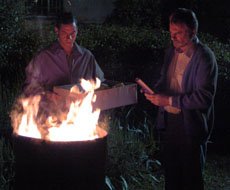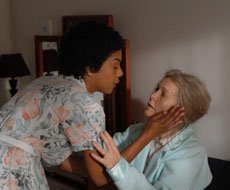|
director’s notes
SKIN is a tale of mythic proportions, which tackles the eternal human question: who am I and where do I belong? Historical and political events and the absurdities of apartheid are all touched on by the film, as Sandra Laing’s story is emblematic of the country’s struggle for freedom and transformation. However my focus remains on the personal rather than the political: this is the story of one woman’s search for love, identity and family — all lost and regained. SKIN has an epic quality, thanks to the boundless and ancient landscape of South Africa. The early part of Sandra Laing’s life takes on the muted, restrained colours of the white community. The latter part benefits from the rich contrasts of life in the black community and reflects Sandra’s journey into colour.
Although the story spans 30 years, the film compresses time.
The script’s flashback structure releases the narrative
from the usual strictures of traditional biographical films:
we begin with the adult Sandra at the end of apartheid. She
is happy for the country, but the ache of losing her parents
has never gone away. The events from the past come flooding
back, until we return to this moment and overtake it to
reach the moving climax — Sandra’s reconciliation
with her mother.

Abraham burns Sandra’s things
links
• IMDB• Woman’s Hour (BBC Radio 4) |
Similarly, the score (by British composer
Hélène Muddiman) acts as a counterpoint to the
story and weaves a tapestry of Western and African sounds.
African instruments such as the kora, thumb piano and
antelope horn play alongside traditional western instruments
to create a unique orchestration. The sound-world of the
film is also rich with local detail, from the bird and
animal life to the sounds of the townships.

Young Sandra (Ella Ramangwane) and her parents (Sam Neill and Alice Krige)
| |||


